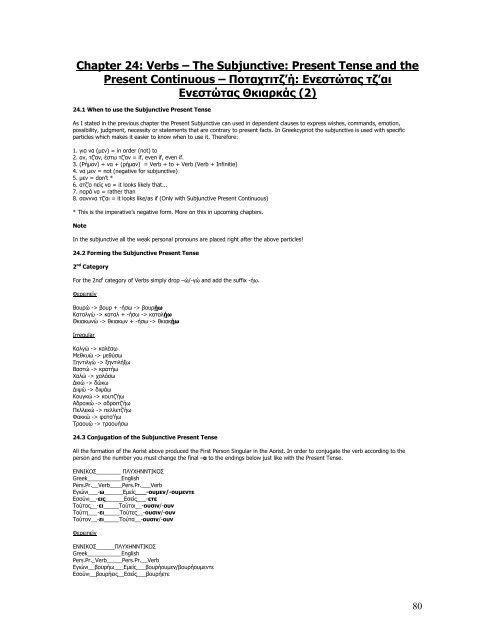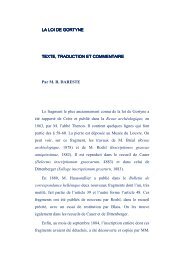CYPRIOT GRAMMAR
CYPRIOT GRAMMAR
CYPRIOT GRAMMAR
Create successful ePaper yourself
Turn your PDF publications into a flip-book with our unique Google optimized e-Paper software.
Chapter 24: Verbs – The Subjunctive: Present Tense and the<br />
Present Continuous – Ποταχτιτζ’ή: Ενεστώτας τζ’αι<br />
Ενεστώτας Θκιαρκάς (2)<br />
24.1 When to use the Subjunctive Present Tense<br />
As I stated in the previous chapter the Present Subjunctive can used in dependent clauses to express wishes, commands, emotion,<br />
possibility, judgment, necessity or statements that are contrary to present facts. In Greekcypriot the subjunctive is used with specific<br />
particles which makes it easier to know when to use it. Therefore:<br />
1. για να (μεν) = in order (not) to<br />
2. αν, τζ’αν, έστω τζ’αν = if, even if, even if.<br />
3. (Ρήμαν) + να + (ρήμαν) = Verb + to + Verb (Verb + Infinitie)<br />
4. να μεν = not (negative for subjunctive)<br />
5. μεν = don’t *<br />
6. ατζ’α πείς να = it looks likely that...<br />
7. παρά να = rather than<br />
8. σανννα τζ’αι = it looks like/as if (Only with Subjunctive Present Continuous)<br />
* This is the imperative’s negative form. More on this in upcoming chapters.<br />
Note<br />
In the subjunctive all the weak personal pronouns are placed right after the above particles!<br />
24.2 Forming the Subjunctive Present Tense<br />
2 nd Category<br />
For the 2nd t category of Verbs simply drop –ώ/-γώ and add the suffix -ήω.<br />
Φερειπείν<br />
Βουρώ -> βουρ + -ήσω -> βουρήω<br />
Καταλγώ -> καταλ + -ήσω -> καταλήω<br />
Θκιακωνώ -> θκιακων + -ήσω -> θκιακήω<br />
Irregular<br />
Καλγώ -> καλέσω<br />
Μεθκυώ -> μεθύσω<br />
Ξηντιλγώ -> ξηντιλήξω<br />
Βαστώ -> κρατήω<br />
Χαλώ -> χαλάσω<br />
Δκιώ -> δώκω<br />
Διψώ -> διψάω<br />
Κουγκώ -> κουτζ’ήω<br />
Αδροικώ -> αδροιτζ’ήω<br />
Πελλεκώ -> πελλετζ’ήω<br />
Φακκώ -> φατσ’ήω<br />
Τραουώ -> τραουήσω<br />
24.3 Conjugation of the Subjunctive Present Tense<br />
All the formation of the Aorist above produced the First Person Singular in the Aorist. In order to conjugate the verb according to the<br />
person and the number you must change the final –α to the endings below just like with the Present Tense.<br />
ΕΝΝΙΚΟΣ________ ΠΛΥΧΗΝΝΤΙΚΟΣ<br />
Greek___________English<br />
Pers.Pr.__Verb____Pers.Pr.___Verb<br />
Εγιώνι___-ω______Εμείς___-ουμεν/-ουμεντε<br />
Εσούνι__-εις______Εσείς___-ετε<br />
Τούτος__-ει_____Τούτοι__-ουσιν/-ουν<br />
Τούτη___-ει_____Τούτες__-ουσιν/-ουν<br />
Τούτον__-ει_____Τούτα__-ουσιν/-ουν<br />
Φερειπείν<br />
ΕΝΝΙΚΟΣ______ΠΛΥΧΗΝΝΤΙΚΟΣ<br />
Greek___________English<br />
Pers.Pr._Verb_____Pers.Pr.__Verb<br />
Εγιώνι__βουρήω___Εμείς___βουρήουμεν/βουρήουμεντε<br />
Εσούνι__βουρήεις__Εσείς___βουρήετε<br />
80





